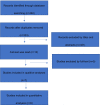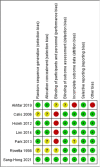The Effect of Intra-articular Injection of Hyaluronic Acid in Frozen Shoulder: a Systematic Review and Meta-analysis of Randomized Controlled Trials
- PMID: 35241100
- PMCID: PMC8896272
- DOI: 10.1186/s13018-022-03017-4
The Effect of Intra-articular Injection of Hyaluronic Acid in Frozen Shoulder: a Systematic Review and Meta-analysis of Randomized Controlled Trials
Abstract
Background: Frozen shoulder (FS) is a common progressive disorder that causes restricted motion and refractory pain undermining quality of life. Intra-articular hyaluronic acid (HA) injection is a widely adopted conservative therapy relieving symptomatic FS, whereas the effect of which were contradictory and unclear in current literatures. The aim of the present study is to investigate whether intra-articular HA administration facilitates symptomatic pain relief and functional improvements in patients diagnosed with shoulder FS.
Methods: The PubMed, Embase, Cochrane Library electronic databases and Google scholar were searched, from inception to 15th Jan 2022. Randomized controlled trials (RCTs) comparing intra-articular HA administration with any other non-surgical treatment in patients with FS were included. Risk of bias was evaluated using the Cochrane risk-of-bias tool and meta-analyses were undertaken to pool the data of visual analog scale for pain, range of motion (ROM) in external rotation, abduction, and flexion, as well as Shoulder Pain and Disability Index (SPADI), Constant score and American Shoulder and Elbow Surgeons (ASES).
Results: The present study included 7 RCTs involving 504 patients. The results provided no support for superior pain control in patients undergoing HA injection compared with any other treatment (p = 0.75). Furthermore, HA group failed to exert superior improvements to other treatments in ROM concerning abduction (p = 0.69) and flexion (p = 0.33). However, HA injection was observed to facilitate functional recovery in external rotation (p = 0.003). In addition, the pooled data showed a significant higher SPADI score in control group than in HA group (p = 0.01), while no statistical significance between two groups was observed in Constant score (p = 0.36) and ASES (p = 0.76).
Conclusions: The current meta-analysis suggested that HA is a beneficial treatment procedure in improving the ROM of the shoulder for patients with FS, whereas the effect in relieving pain may be equal to the existing therapy. In conclusion, Intra-articular HA injection is recommended for FS patients.
Keywords: Adhesive capsulitis; Frozen shoulder; Hyaluronic acid; Meta-analysis.
© 2022. The Author(s).
Conflict of interest statement
The authors have no conflicts of interest to declare.
Figures






Similar articles
-
Effectiveness of hyaluronic acid administration in treating adhesive capsulitis of the shoulder: a systematic review of randomized controlled trials.Biomed Res Int. 2015;2015:314120. doi: 10.1155/2015/314120. Epub 2015 Jan 31. Biomed Res Int. 2015. PMID: 25802845 Free PMC article.
-
The use of hyaluronic acid in the treatment of shoulder capsulitis: a systematic review.J Biol Regul Homeost Agents. 2017 Dec 27;31(4 Suppl 2):23-32. J Biol Regul Homeost Agents. 2017. PMID: 29202560
-
Treatment effects of ultrasound-guided capsular distension with hyaluronic acid in adhesive capsulitis of the shoulder.Arch Phys Med Rehabil. 2013 Feb;94(2):264-70. doi: 10.1016/j.apmr.2012.10.002. Epub 2012 Oct 12. Arch Phys Med Rehabil. 2013. PMID: 23063625 Clinical Trial.
-
Intra-Articular versus Subacromial Corticosteroid Injection for the Treatment of Adhesive Capsulitis: A Meta-Analysis and Systematic Review.Biomed Res Int. 2019 Oct 15;2019:1274790. doi: 10.1155/2019/1274790. eCollection 2019. Biomed Res Int. 2019. PMID: 31737653 Free PMC article.
-
Comparison of the treatment efficacy of suprascapular nerve block and intra-articular shoulder injection techniques in patients diagnosed with adhesive capsulitis.PM R. 2025 May;17(5):505-512. doi: 10.1002/pmrj.13286. Epub 2024 Dec 2. PM R. 2025. PMID: 39620378 Clinical Trial.
Cited by
-
Comparison of efficacy three-site versus single-site steroid injections for the treatment of adhesive capsulitis.Ann Med Surg (Lond). 2022 Jun 28;79:104071. doi: 10.1016/j.amsu.2022.104071. eCollection 2022 Jul. Ann Med Surg (Lond). 2022. PMID: 35860100 Free PMC article.
-
Basic Science Research in Frozen Shoulder: Current Updates.Indian J Orthop. 2024 Dec 2;59(6):774-784. doi: 10.1007/s43465-024-01294-1. eCollection 2025 Jun. Indian J Orthop. 2024. PMID: 40511347
-
Efficacy of manipulation under anesthesia with ultrasound-guided platelet-rich plasma injection in shoulder stiffness concomitant with rotator cuff injury.JSES Rev Rep Tech. 2025 Mar 23;5(3):413-422. doi: 10.1016/j.xrrt.2025.02.008. eCollection 2025 Aug. JSES Rev Rep Tech. 2025. PMID: 40697290 Free PMC article.
-
Clinical and Biochemical Implications of Hyaluronic Acid in Musculoskeletal Rehabilitation: A Comprehensive Review.J Pers Med. 2023 Nov 26;13(12):1647. doi: 10.3390/jpm13121647. J Pers Med. 2023. PMID: 38138874 Free PMC article. Review.
-
Safety and Efficacy of Embolization with Microspheres in Chronic Refractory Inflammatory Shoulder Pain: A Pilot Monocentric Study on 15 Patients.Biomedicines. 2022 Mar 22;10(4):744. doi: 10.3390/biomedicines10040744. Biomedicines. 2022. PMID: 35453492 Free PMC article.
References
Publication types
MeSH terms
Substances
LinkOut - more resources
Full Text Sources
Medical

